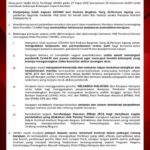THE Association of Small and Medium Enterprises (SAMENTA) recommends that the new Cabinet provides more focus on SMEs businesses besides consumer segment. Among suggestions made to the government in sorting out ther cash flow problems are:
1. Corporate tax reduction for assessment years 2021 and 2022.
2. Exemption and reduction of payments to the Human Resource Development Fund (HRDF), and
3. Replace Sales and Services Tax (SST) with Goods and Services Tax (GST) at a rate of 4%.
I fully agree that economic recovery cannot be 100 per cent focused on financial assistance to consumers without appropriate interventions to entrepreneurs and SMEs but I somehow am not in favor of GST being reintroduced at the moment, albeit at a lower rate than SST.
True, GST is a more transparent tax and helps SME businesses to ‘claim’ input tax. But with the introduction of GST as well, the cost will be passed down to consumers.
If GST is not abolished first, this issue will not arise. Once it is repealed an reintroduced, there will be a cost effect of the transition that is capable of impacting consumers. ‘Timing’ does not match.
The intervention should not hurt the level of consumption at a time when consumer spending is still lower than before Covid-19. Not only will it hamper spending but it will not add significant revenue to the government.
Once the economy recovers, then it is appropriate for us to review the implementation of GST.
Other proposals from SAMENTA could be considered such as the proposed reduction of HRDF levy contributions.
The financial level of the agency is seen to be still good with funds from the government in addition to contributions from larger companies that recorded profits. In addition, some other endeavors I once noted for consideration:
– Measures that can increase loans from development financial institutions (DFIs) to SMEs.
– Bank Negara channels funds to commercial banks at zero cost, provided that the funds are channeled in the form of loans to SMEs.
– (If there is no other way) Capital injection into SMEs like Danaharta before.
As long as the move can help SME cash flow, it should be refined as commercial banks today are seen as unwilling to extend credit to SMEs.
SHAHRIL HAMDAN
Information Chief







